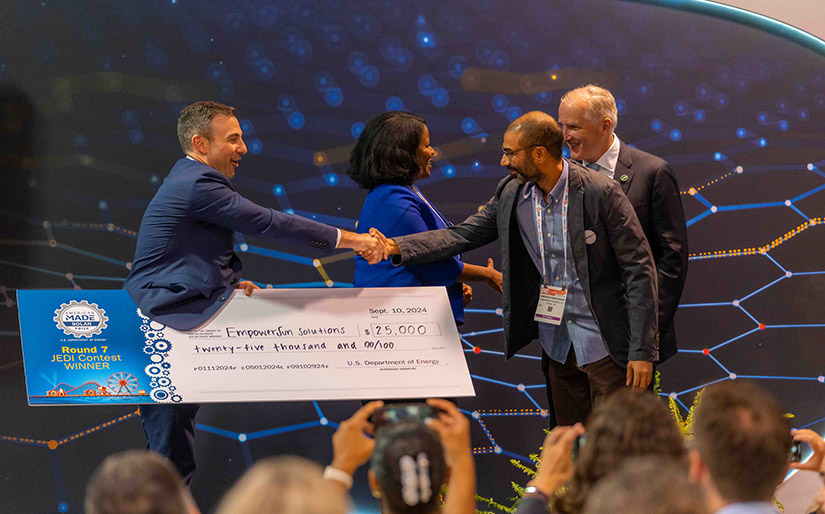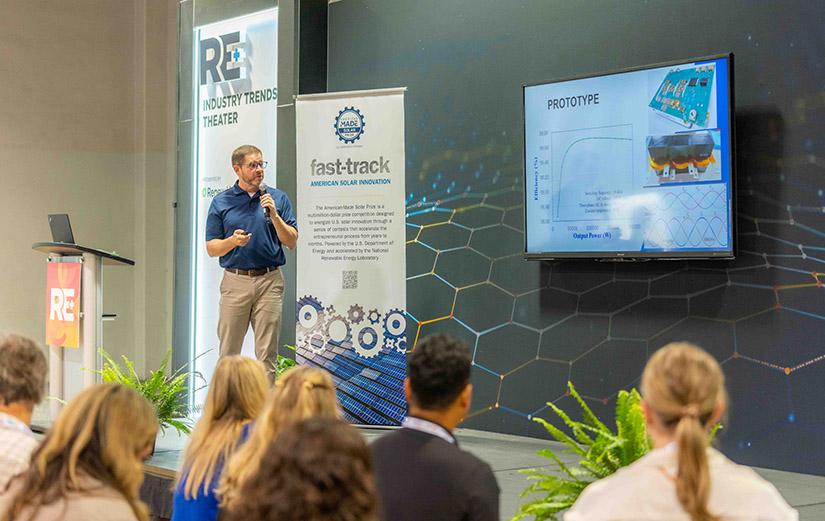First Cohort of Solar Energy Innovators Awarded in Solar Prize Round 8
20 Winners Receive $50,000 Each To Advance Their Solar Concepts in the Set! Contest
After competing in the Ready! Contest in the American-Made Solar Prize Round 8, 20 new innovators are now on their way to advancing technologies that can support the solar industry’s growth and adoption. These semifinalist teams each won $50,000 to further their innovations in the second phase of the prize.
The U.S. Department of Energy (DOE) Solar Energy Technologies Office (SETO) also awarded $25,000 each in additional cash prizes to four bonus prize winners for solutions that increase availability of solar adoption locally.
SETO also selected seven teams to receive Power Up Contest awards. The Power Up Contest, which was designed to support new entrants to the solar industry, rewards submissions that showed strong potential but were not selected to move forward in the prize. Power Up Contest winners are encouraged to use their cash award, along with support from American-Made Power Connector RTI International, to refine and strengthen their innovations and commercialization plans in preparation for future competitions.
“The submissions to this round of the Solar Prize demonstrate the breadth of innovation that can come from citizen innovators and entrepreneurs,” said Markus Beck, program manager for SETO’s Manufacturing and Competitiveness team. “From the semifinalists to the teams awarded through the Power Up Contest, the winning teams in this phase are going to help change the game when it comes to solar deployment, operations, and other pivotal parts of the industry.”

Each year, the Solar Prize awards millions of dollars in cash to innovators in the solar industry, such as Empower Innovations, a winner of Round 7. Photo from Corcino Productions
Support for Solar Innovation at Every Stage
The Solar Prize was launched in 2018 and remains the flagship prize of the American-Made program. Since its inception, the prize has successfully supported a variety of technologies that can push the solar industry forward—from lighter, more cost-efficient photovoltaic systems to software that simplifies solar system maintenance.
Each round of the Solar Prize consists of three contests—Ready!, Set!, and Go!—with increasing levels of financial support awarded at each phase. The awards and deadlines give competitors the support and structure they need to steadily progress their concepts from ideas to prototypes. Throughout the three contests, competitors can also rely on the expertise of American-Made Network members, who may represent an incubator, a private entity, a national laboratory, or other industry experts.
The semifinalist teams moving on the Set! Contest are as follows:
Deployment and Workforce
- Cosmic Robotics (San Francisco, California) – This team is developing robots to pick up and place solar modules on single-axis solar trackers, automating a dangerous and laborious task in the installation process. Through this innovation, a network of robots could work alongside human crews to accelerate the deployment of utility-scale solar.
- IWNL Energy (Orlando, Florida) – This team is developing a multilingual, comprehensive, user-centered software platform called the Solar Energy Career Navigator. This platform aims to reduce barriers to entry and bridge the gap between potential workers and employers, guiding them toward fulfilling careers in the solar energy sector. Bonus prize winner
- PowerTechs (Austin, Texas) – This team is developing a reskilling and skills assessment platform for the renewable energy workforce that combines artificial intelligence and extended reality. This solution will help address the solar workforce shortage and accelerate deployment of solar energy.
- Samtracs (San Antonio, Texas) – This team is automating solar farm construction through on-site, mobile construction equipment combined with redesigned single-axis tracker components. This new assembly process and tracker design will reduce labor requirements for solar farm construction and decrease construction time.
- Solar Tech Collective (Tucson, Arizona) – This team is developing a mobile-based training app, SolTrain, for solar installation field technicians. The app will provide microlessons focused on essential field skills and will validate technician competency to lower operational costs for solar asset owners.
Dual-Use Photovoltaics
- Fundusol LLC (Stanford, California) – This team is developing a modeling software to design and optimize agrivoltaics systems by modeling multiple factors to predict the performance of the agrivoltaic system on each farm's crop and/or livestock. This solution will help accelerate the deployment of solar in agricultural environments.
- Icarus (San Diego County, California) – This team is developing a solution that integrates photovoltaics (PV) and solar thermal technologies by capturing and converting waste heat to create a hybrid PV and thermal cogeneration system. This solution will improve the power performance of commercial PV arrays and generate hot water that can be stored for on-demand energy needs.
- Serida Inc. (Ithaca, New York) – This team is developing an agrivoltaics deployment software to enable solar developers to design agrivoltaic systems through advanced microclimate modeling and crop algorithms. This solution will help empower rural communities to go solar by maximizing the community benefits of agrivoltaics.
- Watts on Water (San Diego, California) – This team is developing an automated, geographic information system-based solar siting and design software tailored to floating photovoltaics (FPV) systems. Through FPV-specific design parameters and cobenefits analysis, this solution will support the deployment of FPV through streamlining tools such as siting and design and customer acquisition.
Finance and Business Models
- Eighth Generation Consulting (Osage County, Oklahoma) – This team is developing a solar asset management software using artificial intelligence, computer vision, geographic information systems, and permitting data to streamline how solar is permitted, serviced, and decommissioned. Through cradle-to-grave tracking, this solution will enable accurate and cost-effective management and decommissioning of solar assets. Bonus prize winner
- Greengrid Inc. (Laconia, New Hampshire) – This team is developing a platform that finances solar rooftop projects by leveraging corporate renewable energy certificate (REC) commitments. By bundling small-scale solar projects into large, high-impact REC portfolios, this solution reduces financial barriers to rooftop solar.
- Rayva (Gilbert, Arizona) – This team is partnering with roofers and builders to install their building-integrated solar modules during the construction of new homes or roof replacements. This building-integrated solar module, combined with a streamlined business-to-business sales model, will reduce costs and expand the availability of solar to homeowners. Bonus prize winner
- TEAM CBA (Atlanta, Georgia) – This team is developing a tool to help communities and renewable energy project sponsors develop community benefit agreements. The tool assists with facilitating discovery and research, establishing key impact initiatives and success indicators, drafting and monitoring agreements, and tracking and reporting. Bonus prize winner
Photovoltaics
- Full Charge Solar (Austin, Texas) – This team is developing a fully collapsible, emission-free, cart-based solar array with a battery and inverter that requires little to no maintenance. This system provides electricity throughout the day while charging a battery to provide electricity at night and can serve emergency situations when power is not available.
- Martin Solar (Mascoutah, Illinois) – This team is developing a new mounting system for residential solar that does not require drilling into homeowners’ roofs. This leak-proof mount will protect rooftops from damage and increase consumer confidence in rooftop solar.
- Plug & Play Solar Wing (Atlanta, Georgia) – This team is developing a quick-deploy, expandable solar PV array suitable for applications such as carports and disaster relief. This expandable design allows the Solar Wing to eliminate more than 95% of on-site installation activities, making it easy to relocate to new sites in the future.
Systems Integration
- Expand Power Technologies Inc. (San Francisco, California) – This team is developing a novel inverter-based transformer that is smaller, safer, and smarter than traditional designs. This compact solution will expand access to solar in space-limited areas, such as urban environments, and reduce lead times by leveraging U.S.-based manufacturing capabilities.
- Flip Energy (San Francisco, California) – This team is developing a turnkey platform to allow homeowners with solar and storage to more easily participate in virtual power plants, which can allow them to generate revenue from their solar-plus-storage systems. This solution will help make residential solar and storage more affordable and available for homeowners while also supporting grid reliability.
- NetMeterGO.com (Las Vegas, Nevada) – This team is developing a platform that automates affordable net meter interconnection for small- and medium-sized utilities. This solution will promote solar power through streamlined and automated interconnection queue management.
- WattShift Inc. (Chicago, Illinois) – This team is developing a software platform for managing home energy devices, aligning demand with renewable energy availability. This management system dynamically optimizes energy use while reducing consumer costs and enabling more renewables on the grid.
The Power Up Contest winners are as follows:
- BloomBox Design Labs (Menlo Park, California) – This team is developing a modular and retractable solar roof system that is securely mounted on shipping containers to bring solar energy to off-grid communities.
- Insitu Energy (San Francisco, California) – This team is developing a platform that helps communities assess solar potential on brownfield sites—previously occupied properties that may be difficult to reuse due to the potential presence of contaminants—and recommends quality projects to developers.
- Okovate Sustainable Energy (Oxon Hill, Maryland) – This team is developing an agrivoltaic leasing web tool to assess solar and agriculture income for farmers, using simple inputs about their land to empower decision-making.
- Sprightful (Miami, Florida) – This team is developing a community-driven platform to educate interested homeowners on solar PV installation best practices and communicate with existing system owners.
- Sundial (Spanish Fork, Utah) – This team is developing universal solar trackers for both flat and slanted roofs, allowing panels to track the sun and generate 20%–30% more energy.
- Team Little Bob (Newark, Delaware) – This team is developing a virtual marketplace for community solar aimed at low-to-moderate income communities that allows current subscribers to invest in future projects.
- Venki Energy (Silver Spring, Maryland) – This team is developing a removable rooftop array that can reduce the soft costs of solar installation and enable subscription solar business models.

Solar Prize finalists pitch their innovations each year at the annual RE+ Conference before finding out who is awarded the grand prize. Photo from Corcino Productions
What Is Next
The semifinalists will now get to work refining their concepts and getting ready to present at the Set! Interview Day in April 2025. Teams will discuss their progress and answer questions from a panel of industry experts about their technologies. Ten finalists will be chosen from among the teams and awarded $100,000 in cash and $75,000 in technical assistance each to further prepare their concepts for the final Go! Demo Day in September.
Learn more about the Solar Prize andsubscribe to the American-Made program newsletter for updates on this round, competitors’ innovative ideas, and how to get involved in future prizes.
This article has been updated to reflect editorial changes made after its original publication.
Last Updated May 28, 2025
